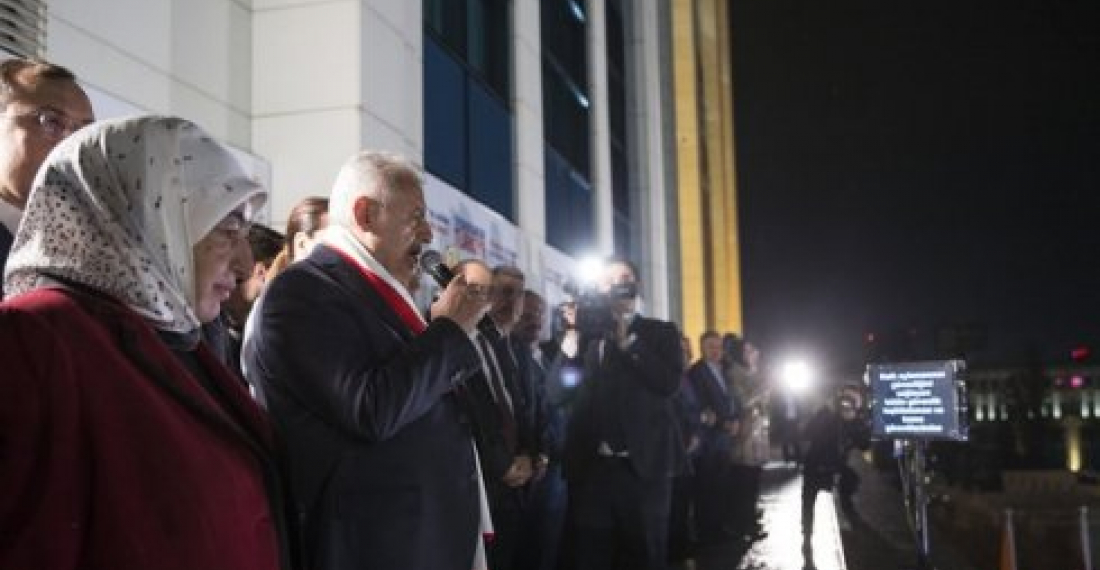Update 4, 19.15 GMT
With 99.27% of the votes counted, the yes vote appears to have won the constitutional referendum in Turkey, with 51.35% voting yes, and 48.65% voting no. Opposition leaders are calling foul, and have asked for recounts in many polling stations.
However, Turklish Prime Minister Binali Yildirim has declared that the yes vote has won. Speaking to supporters at the headquarters of the AK Party in Ankara Yildirim sai"This is a decision made by the people. In our democracy's history, a new page has opened."
The prime minister said the last word has been said by the nation and thanked all nation whether they voted "yes" or "no".
"There are no losers in this referendum. The whole nation emerged as the winner," he said.
photo: Turkish Prime Minister Binali Yildirim declaring a victiory for the yes vote in the 16 April referendum (picture courtesy of Anadolou News Agency, Ankara)
Update 3, 15.45 GMT
With 81% of the votes counted, the yes vote is leading by 53.9% against the no vote 46.1% according to the official Anadolou agency
Update 2, 15.15 GMT
Although technically there is uspposed to be a blackout on resulta until 18.00 GMT, most Turkish media are now ignoring this and have started giving results. Hurriyet Daily News reports that with 40% of ballot boxes opened, the yes vote has 59.4% and the no vote 40.6%. Turnout was reported to have been very high.
Update 1 - Sunday, 16 April 14.30 GMT
Polling has closed in Turkey's crucial consitutional referendum. Results are expected to start coming in shortly after 18.00 GMT
......................................
More than 55 million Turks are voting today in a referendum that has split the nation, and which will have wide ranging consequences for the country and for its neighbours.
The historic referendum proposes key constitutional changes, including giving wide-ranging executive powers to the president.
Citizens are casting their ballots at 167,000 polling stations nationwide. Over 1 million of them are first-time voters who recently turned 18.
In today's vote ballots have two sides with two different colors, and voters will indicate their choice by voting either Yes on the white side of the paper or No on the brown side. Voters will impress a seal on the side they have chosen.
Poling stations opened at 8 a.m. (0500GMT) and people would be allowed to vote until 5 p.m. (1400GMT).
The electorate in Turkey is being asked to vote Yes or No to an 18-article reform bill, which would also change the current parliamentary system to a presidential one.
The Yes campaign is backed by the ruling Justice and Development (AK) Party and the opposition, Nationalist Movement Party (MHP), whereas the main opposition, Republican People's Party (CHP), is in favor of No.The proposals are also opposed by the main political forces in the predominatly Kurdish areas of the South East.
Approximately 2.9 million Turkish expatriates have already voted in the referendum between March 27 and April 9.
Commonspace.eu political editor said that today's referendum result will have wide ranging implications both for Turkey as well as for Turkey's relations with its neighbours.
"Internally there is fear that the referendum opens the way to dictatorship, although others say that a more empowered President may be able to push through important changes, particularly as regards the Kurdish issue. The referendum is likely also to impact relations between Turkey and the EU, considered at the moment to be at their lowest point for many years. Turkey could either abandon any hope of joining the EU and readjust its foreign policy - which may have also implications for NATO, or the result could be used to re-energise relations.
For the neighbouring South Caucasus countries the current uncertainties in Turkey are a cause for concern, although for different reasons. Azerbaijan which has very strong and close relations with Turkey, is concerned about political upheavel of its closest ally. Conversely, Armenia which has strained relations with Turkey, is also concerned that political uncertainties may trigger new complications in its relations with its big neighbour, and make any prospect for rappraochment even more difficult. Georgia also has very close economic and military relations with Turkey. Georgia is concerned about problems between Turkey and NATO and the EU, and would like to see politics returning to normal in Turkey as soon as possible. When the results are out later this evening all three countries will be taking stock on how it is going to effect them."
source: commonspace.eu with Anadolou News Agency, Ankara
photo: A polling station in Turkey's Erzerum prepares for today's poll (picture courtesy of Anadolou News Agency, Ankara).






